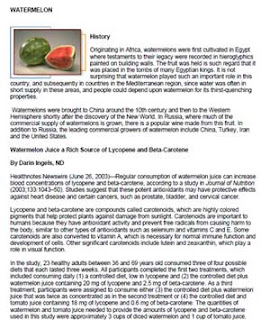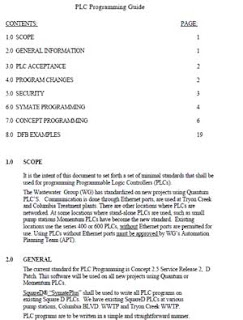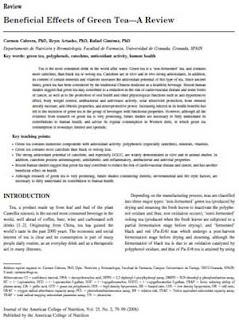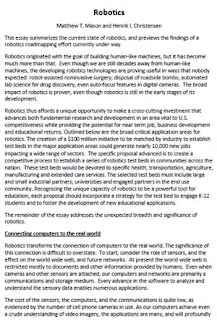Healthnotes Newswire (June 26, 2003)—Regular consumption of watermelon juice can increase
blood concentrations of lycopene and beta-carotene, according to a study in Journal of Nutrition
(2003;133:1043–50). Studies suggest that these potent antioxidants may have protective effects
against heart disease and certain cancers, such as prostate, bladder, and cervical cancer.
Lycopene and beta-carotene are compounds called carotenoids, which are highly colored
pigments that help protect plants against damage from sunlight. Carotenoids are important to
humans because they have antioxidant activity and prevent free radicals from causing harm to
the body, similar to other types of antioxidants such as selenium and vitamins C and E. Some
carotenoids are also converted to vitamin A, which is necessary for normal immune function and
development of cells. Other significant carotenoids include lutein and zeaxanthin, which play a
role in visual function.
In the study, 23 healthy adults between 36 and 69 years old consumed three of four possible
diets that each lasted three weeks. All participants completed the first two treatments, which
included consuming daily (1) a controlled diet, low in lycopene and (2) the controlled diet plus
watermelon juice containing 20 mg of lycopene and 2.5 mg of beta-carotene. As a third
treatment, participants were assigned to consume either (3) the controlled diet plus watermelon
juice that was twice as concentrated as in the second treatment or (4) the controlled diet and
tomato juice containing 18 mg of lycopene and 0.6 mg of beta-carotene. The quantities of
watermelon and tomato juice needed to provide the amounts of lycopene and beta-carotene
used in this study were approximately 3 cups of diced watermelon and 1 cup of tomato juice.
Blood levels of lycopene and beta-carotene were measured at the beginning and completion of
each three-week treatment period.
The watermelon juice diet increased blood concentrations of lycopene and beta-carotene almost
five-fold and two-fold, respectively, compared with the diet without watermelon juice. However,
there was no significant increase in lycopene or beta-carotene levels when the amount of
watermelon juice was doubled. Consumption of tomato juice produced a similar increase in
blood lycopene concentrations, but failed to increase beta-carotene levels.
Download Link : click here

























.jpg)

0 Comment:
Say what you think ...